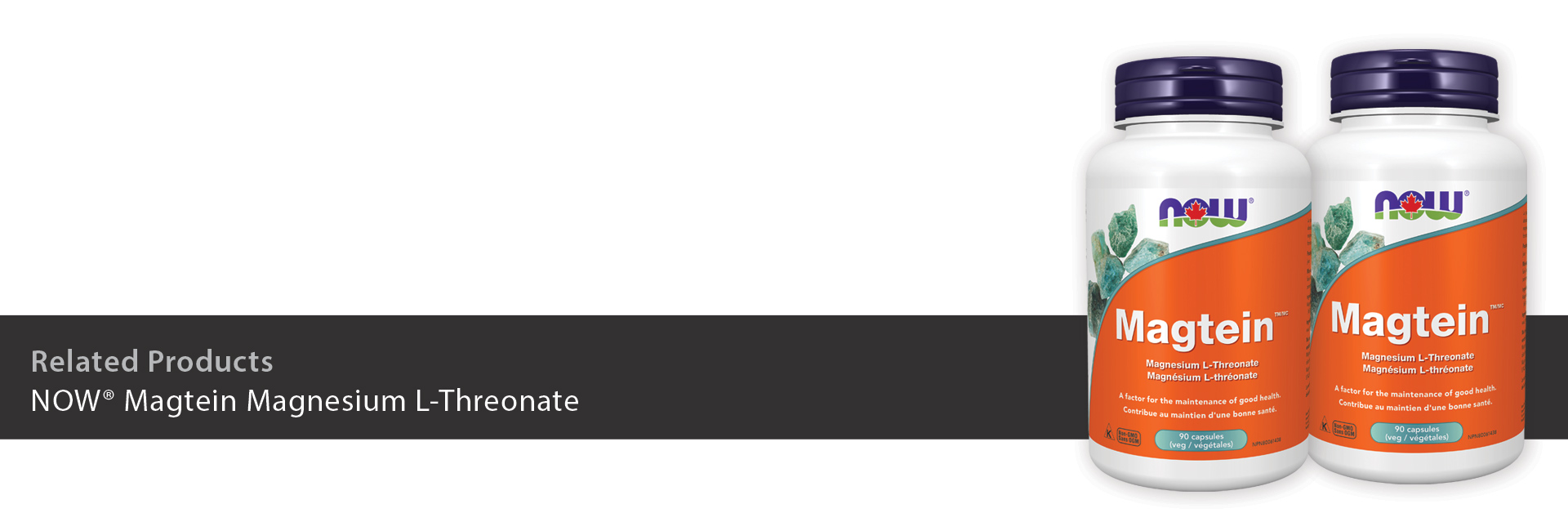

All Things Magnesium
Magnesium has garnered much attention over the past decade. It is responsible for an estimated 300 enzymatic reactions, ergo numerous pathways, in our body. Some of its “job requirements” include transporting calcium to our bones, making energy, repairing our DNA, and helping cells communicate with one another. Not too shabby! Low magnesium levels are associated with high blood pressure, heart disease, osteoporosis, diabetes, muscle spasms, migraines, and a range of neurological disorders.
Magnesium deficiencies. An estimated 60 % of people do not meet Health Canada’s recommended daily intakes (DI) of 320 mg/day for women and 420 mg/day for men. Some experts blame this shortcoming on modern farming techniques (phosphate-based fertilizers render magnesium insoluble) and food processing (high heat cooking and grain bleaching). The use of fluoridated, softened and purified tap water reduces another potential source of magnesium. Added to this are caffeinated drinks, alcoholic beverages, and select medications (including some types of blood pressure drugs, antibiotics, antacids, and oral contraceptives), all of which increase loss or reduced absorption of magnesium.
Who should supplement with magnesium? While many people may be low in magnesium, determining your status is challenging to say the least. Why? Standardized laboratory testing is lacking, unreliable and outdated. Since most of our magnesium is stored in our bones and soft tissues, blood tests can act as a proxy for magnesium levels, at best. Ultimately, most of us will rely on symptoms of deficiencies, such as muscle cramps. Your doctor will often look to circumstantial evidence such as antacid use, a poor diet, or the existence of a condition where magnesium deficiency is more common such as diabetes. It is also common to use magnesium whenever calcium is supplemented; this helps preserve a balance between these two minerals.
Best sources of magnesium. When it comes to food sources of magnesium, leafy greens are premium, followed by nuts and whole grains. As for supplements, it is a virtual wild west of options: oxide, chloride, sulphate, carbonate, acetate, citrate, gluconate, lactate, aspartate, bisglycinate, oh my! Some consumers seek out the most bioavailable (best absorbed) sources of magnesium, especially those sensitive to its laxative effects. The least absorbable magnesium is magnesium oxide, followed by pretty much all the rest, and potentially topped off by magnesium bisglycinate. Absorption may be improved by taking magnesium in divided doses throughout the day, versus in one large bolus. Having said that, your existing magnesium status likely has the most significant influence over absorption, and all forms of magnesium are capable of correcting a deficiency. So, it is best to focus on other potential unique characteristics of each type of magnesium combination when coming to a decision.
The magnesium for your brain: There has been growing interest in a unique form of magnesium called Magtein™ Magnesium L-Threonate. This novel trademarked form is clinically proven to cross the blood-brain barrier. In fact, Magtein™ is the only magnesium compound that effectively raises the brain’s magnesium levels in both young and aged animals. Magtein™, at least in animal studies, has been shown to enhance learning abilities, working memory, and long and short-term memory. For all of these reasons, Magtein™ is the preferred form of magnesium for those resistant to normal magnesium therapy when it comes to migraines, mood, ADHD, insomnia, or any other brain-related issues. A 2021 open-label pilot study on ADHD adults was encouraging, finding Magtein™ to be effective and well-tolerated. NOW Health Group offers a variety of high-quality magnesium supplements at a good value, including NOW® Magtein™ Magnesium L-Threonate.
References:
1. Hanxiao Liu, Yue Li, Yan Wang, Xinxing Wang, Xu An, Siying Wang, Lin Chen, Guosong Liu, and Yupeng Yang. The distinct role of NR2B subunit in the enhancement of visual plasticity in adulthood. Mol Brain. 2015; 8: 49.
2. Andrew Mickley, Nita Hoxha, Joseph L. Luchsinger, Morgan M. Rogers, and Nathanael R. Wilesa. Chronic dietary magnesium-L-threonate speeds extinction and reduces spontaneous recovery of a conditioned taste aversion. Pharmacol Biochem Behav. 2013 May; 106: 16–26.
3. Wei Li, Jia Yu, Yong Liu, Xiaojie Huang, Nashat Abumaria, Ying Zhu, Xian Huang, Wenxiang Xiong, Chi Ren, Xian-Guo Liu, Dehua Chui, Guosong Liu. Elevation of brain magnesium prevents synaptic loss and reverses cognitive deficits in Alzheimerʼsdisease mouse model. Mol Brain. 2014; 7: 65. ncbi.nlm.nih.gov/pmc/articles/PMC5652077/
4. Slutsky I, Abumaria N, Wu LJ, Huang C, Li B, Govindarajan A, Zhao MG, Zhuo M, Tonegawa S, Liu G. “Enhancement of Learning and Memory by Elevating Brain Magnesium.” Neuron, 65: 165–177, 2010.
5. Tang YP, Shimizu E, Dube GR, Rampon C, Kerchner GA, Zhuo M, Liu G, Tsien JZ, “Genetic Enhancement of Learning and Memory in Mice.” Nature, 401:63–69, 1999 (Cover Article).
6. Surman C, Vaudreuil C, Boland H, Rhodewalt L, DiSalvo M, Biederman J. L-Threonic Acid Magnesium Salt Supplementation in ADHD: An Open-Label Pilot Study. J Diet Suppl. 2021;18(2):119-131. doi: 10.1080/19390211.2020.1731044. Epub 2020 Mar 12. PMID: 32162987.

